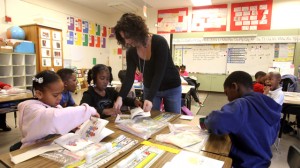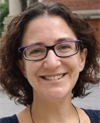This post first appeared in The Washington Post’s Answer Sheet blog.

Teacher Lori Peck, helps first grader Timia Harris at Grace L. Patterson Elementary school in Vallejo, Calif. (AP Photo/Rich Pedroncelli)
A new study showing explosive growth in student poverty suggests, though, that we have misidentified the problem. What if we have actually been teaching the right skills in US schools all along – math and reading, science and civics, along with creativity, perseverance and team-building? What if these were as important a hundred years ago for nurturing innovative farmers and developers of new automobiles as they are now for creating the next generation of tech innovators? What if these are the very characteristics of US schools that have made us such a strong public education nation, and the current shift toward a narrower agenda just dilutes that strength? What if, rather than raising standards, and testing students more, the biggest change we need to address is that of our student body?
The October 2013 Southern Education Foundation study indicates clearly that poverty, which has long been the biggest obstacle to educational achievement, is more important than ever. It is our true 21st century problem. Fifty years ago, we educated mostly working-class kids and up, and we did not expect those at the bottom of the socioeconomic ladder to graduate. Now we educate all students, including the very poorest and otherwise disadvantaged. And we expect them all to graduate. Compounding this shift, a large and growing proportion of US students students live in poverty and even concentrated poverty, have a disability, and/or are learning English as a second language. THAT is the paradigm shift, and we need a totally new set of policies to address that 21st century reality.
In 2000, students who were eligible for free or reduced-price meals made up at least half of the student body in four states. Just eleven years later, over half of public school students are poor in 17 states, including every Southern state but Virginia and Maryland, and most Western states. Student poverty is the dominant reality in schools in three of the biggest states – California, Texas and Florida—and nearly the majority in New York, Michigan and Illinois. The 21st century has sharply increased the proportion of parents who are unemployed, whose jobs do not pay enough to provide basic food, shelter, clothing and health care for their children, and/or whose immigrant status limit their capacity to navigate the education system and restrict them to a shadow economy.
This devastating reality demands a set of education reforms radically different from those on which policy has fixated of late. Without a set of supports that enable all students to acquire basic literacy, problem-solving and communications skills, kindergarten teachers must tailor their instruction to an ever-broader range of academic capacities and behavioral challenges. And too many students will be doomed from a very early age to remedial education and dim prospects of life success. Until we ensure that basic, preventable medical problems do not keep large numbers of students out of class and lack of food does not prevent them from focusing, effective teaching will become further out of reach. So long as we put school nurses, social workers and counselors on the “expendable” list when budgets are tight, teachers will shoulder more non-teaching burdens, and instruction will be impeded. In the absence of systemic, consistent after-school and summer enrichment, a growing number of students will lose much of what they gain during the day and over the school year, wasting taxpayer dollars and future talent.
Not only have we not addressed these realities, we have exacerbated them. Pressure on test scores has crowded out the art, music and drama that cultivate a love of learning and that draw out children’s unique skills. In high-poverty schools especially, drilling in math and reading has dumbed down lessons, frustrated teachers and put students at an even greater disadvantage relative to high-income, experienced, well-rounded peers. Standardization has made it harder to tailor lessons to the unique culture of the community, making instruction more distant and less relevant. This pressure has also sidelined physical education and recess, both of which boost student capacity to focus and learn, and of course are critical to combat our growing child obesity crisis. Finally, it has increased the prevalence of “zero-tolerance” policies that establish harsh disciplinary consequences for even minor infractions and that treat the natural responses to poverty- and school-related stress as near-criminal behaviors.
Kids who are living in poverty need more, not less, of the supports that help upper-class children thrive. These include small classes, challenging, rich curriculum, individualized instruction and supportive responses to emotional and behavioral challenges. It also means ensuring a meaningful “floor” – in terms of school readiness, physical and mental health, and nutrition – on which they can stand in order to viably learn.
We do have a 21st century education crisis – poverty. Until we properly diagnose the illness, however, our prescribed remedies will continue to fall far short.


